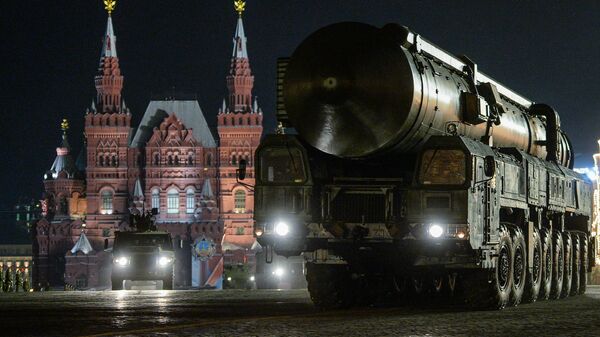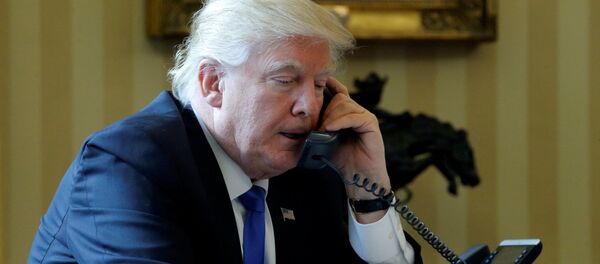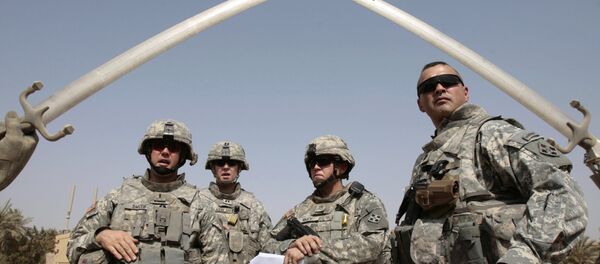In his remarks at the "Strategic Weapons in the 21st Century" Conference on January 26, Payne, the co-founder of the Virginia-based National Institute for Public Policy defense policy think tank, said that "the world has become a much more dangerous place since the 2010 Nuclear Posture Review," and that "Western security policies and practices need to adjust to this new reality."
Stressing that the US's nuclear posture has become hopelessly outdated, Payne warned that China and especially Russia have emerged as key threats to a Washington blinded by thinking that the post-Cold War world order would last forever.
"Russia's explicit nuclear-first use threats and reported planning for first-use employment reflect a partial failure of Western deterrence strategies," Payne claimed, ignoring the fact that Russia faces a NATO opponent that has conventional superiority and has been advancing up to Russia's borders over the past two decades. In fact, Payne suggested that Russia actually had an "escalation advantage" in the short-term, and was thus willing to take risks and provoke NATO to reach its goals.
Analyzing Payne's remarks, military journalist and RIA Novosti contributor Ilya Plekhanov pointed out that the Trump administration may have taken the expert's comments to heart, judging by the fact that they have started dropping some very loud hints that they would be reviewing the 2010 nuclear posture.
Last week, Air Force Chief of Staff General David Goldfein told reporters that the US would complete its new Nuclear Posture Review in the spring, adding that a "fresh look" was needed based on "policy guidance to the [DoD] on where the administration wants us to go."
In light of his influence in Washington policy circles, Plekhanov suggested that Payne's proposals are worth considering very closely. "What is Payne proposing?" the journalist asked. "In his view, until recently, the US has considered the threat of nuclear weapons being used by terrorists as the main problem; Washington's main task was to promote nuclear non-proliferation, and they considered that a reduction in the US nuclear arsenal would encourage other countries to follow in this path."
"Now, [according to Payne], everything has changed," Plekhanov noted. "Starting in 2016, Pentagon reports began stating that nuclear deterrence was the Defense Department's "highest priority mission."
The reason for the shift, Payne said, included "Russia's and China's blatant drives to overturn existing orders and their expanding nuclear capabilities."
In late November, former Defense Secretary Ashton Carter complained that the US and its allies had failed to create any new nuclear weapons, while Russia, China, North Korea, India, Pakistan, "and for a period of time, Iran" continued to do so. The US "[couldn't] wait any longer," to update its arsenal, Carter said.
Therefore, the expert suggested, the 'response' to Russia from the US and its allies must involve the establishment of 'red lines,' the creation of credible Western nuclear escalation options, as well as more spending on NATO front-line states ringing Russia. In any case, Payne stressed that the nuclear deterrent was critical, as "there is no non-nuclear prescription that can fully address Russia's perception of an escalation advantage that is at the heart of the West's deterrence problem."
In other words, the analyst is calling for a 'Peace Through Superior Firepower' doctrine, including in the area of nuclear weapons.
Plekhanov recalled that Payne had written some very similar recommendations in an article for the National Review last year, where he recommended recognizing that the optimistic expectations that emerged after the Cold War did not reflect existing realities, and suggested that the US would have to increase its investment in intelligence to better understand Russia and its nuclear program.
Given President Trump's repeated calls for increasing the strength of the US military, including its nuclear capabilities, Payne and other hawkish analysts like him may now find a more willing ear in the White House, Plekhanov concluded.




